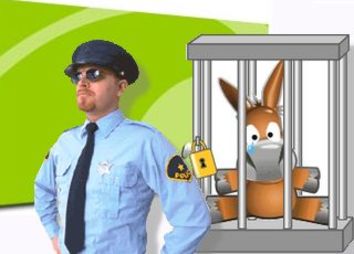ISPs to Start Throttling Pirates, More by July 12
Numerous ISPs including Verizon, Comcast and Time Warner are about to become copyright cops.

The largest Internet service providers in the nation are gearing up to be copyright cops after all -- within months, at that.
Cary Sherman, CEO of the Recording Industry Association of America, said on Wednesday that ISPs are getting ready to seriously crack down on piracy by July 12. These ISPs include Comcast, Cablevision, Verizon, Time Warner Cable and other bandwidth providers. What they will be looking out for is music, movies and software illegally downloaded by subscribers.
The ISPs originally agreed to adopt policing policies back in July 2011, but nothing else has been said about the anti-piracy movement until Sherman's announcement on Wednesday during a panel discussion at the Association of American Publishers' annual meeting. That's because the ISPs needed a year to get everything up and running, and so far most of the participants are on track for the July 12 launch, he said.
"Each ISP has to develop their infrastructure for automating the system," Sherman said. "[They need this] for establishing the database so they can keep track of repeat infringers, so they know that this is the first notice or the third notice. Every ISP has to do it differently depending on the architecture of its particular network. Some are nearing completion and others are a little further from completion."
The anti-piracy program is called "graduate response," and requires that ISPs send out one or two educational notices to customers accused of downloading copyrighted content illegally. If the downloading still continues after the warnings, a confirmation notice is sent out to the suspected pirate, asking that they confirm receipt of the notice. They're also "educated" on the risks of further piracy.
If that still doesn't work, ISPs can then crank up the heat and go into "mitigation measures" mode. Here ISPs can choose to throttle down the connection speed among other penalties. The ISPs can waive the mitigation measure if they choose, CNET reports. So far there's no indication that customers will be kicked off the Internet entirely, but there's a good chance official announcements will be made in the next few months, providing plenty of details.
Get instant access to breaking news, the hottest reviews, great deals and helpful tips.
Kevin started taking PCs apart in the 90s when Quake was on the way and his PC lacked the required components. Since then, he’s loved all things PC-related and cool gadgets ranging from the New Nintendo 3DS to Android tablets. He is currently a contributor at Digital Trends, writing about everything from computers to how-to content on Windows and Macs to reviews of the latest laptops from HP, Dell, Lenovo, and more.
-
jdwii Darn The ISP's are now controlled by The corp heads. It was going to happen eventually everyone has a price!Reply -
the_krasno What if they have bought the movie or game they are torrenting? Doing so is allowed under the revised Millenium Act.Reply -
carnage9270 the_krasnoWhat if they have bought the movie or game they are torrenting? Doing so is allowed under the revised Millenium Act.Reply
Might want to re-look at that...downloading copyrighted software from anywhere other than an authorized location is not legal. Whether you paid for the software/music/or any other digitally copyrighted wares makes no difference. -
How would they know if it was an illegal file? Torrents are legal and can be used to download podcast etc. legally. I have a feeling this is going to hurt legit consumers. Easy way to make people pay more for less bandwidth.Reply
If they are somehow magically able to truly tell whether something is legit or not then this is fine, but the only way I can think of would be an invasion of privacy by monitoring all you network traffic. :P -
wiyosaya JohnpombrioHINT: Use PeerBlock...Unfortunately, ISPs won't need to connect to your computer to determine if you are downloading anything.Reply
As I see it, all they will need to do is monitor traffic through their system noting high-traffic flows, and then use a packet monitor type of program to detect traffic to or from known "pirate" IP addresses. Any such packets found will contain the IP address of the downloading computer.
A more effective block would be something that goes through a VPN so that your real IP would be cloaked, and perhaps there are skillful downloaders out there who would be able to modify their IP address in those same packets so that they could not be traced - if something like that is even possible. -
carnage9270 xLockeXIf they are somehow magically able to truly tell whether something is legit or not then this is fine, but the only way I can think of would be an invasion of privacy by monitoring all you network traffic.Reply
Actually it's your ISP's network traffic. They can monitor anything you do legally. After all, you are using THEIR service. Hence the reason they are doing this at the ISP level.
-
aoneone comcast in northern california has implemented "beginning measures" started jan 31st of 2012. beginning meaning that if anyone exceeds 350gb within 30 day period , a letter will be sent to the specific ip user; warning them that any further grants termination with comcast.Reply
in reality, a yellow flag is lit on the system side where all 350gb users will be under scrutiny and from there on will be scanned for illegal piracy and etc. just a heads up and always remain anonymous! ^_^ -
carnage9270 wiyosayaUnfortunately, ISPs won't need to connect to your computer to determine if you are downloading anything.As I see it, all they will need to do is monitor traffic through their system noting high-traffic flows, and then use a packet monitor type of program to detect traffic to or from known "pirate" IP addresses. Any such packets found will contain the IP address of the downloading computer.A more effective block would be something that goes through a VPN so that your real IP would be cloaked, and perhaps there are skillful downloaders out there who would be able to modify their IP address in those same packets so that they could not be traced - if something like that is even possible.Reply
It doesn't matter what "block" methods you use...the traffic is still routed through your ISP's system, it goes to your modem regardless of what masks you use.
-
drwho1 Since no one said it: poor donkey on the picture, I think that the true animal is outside the cage.Reply
